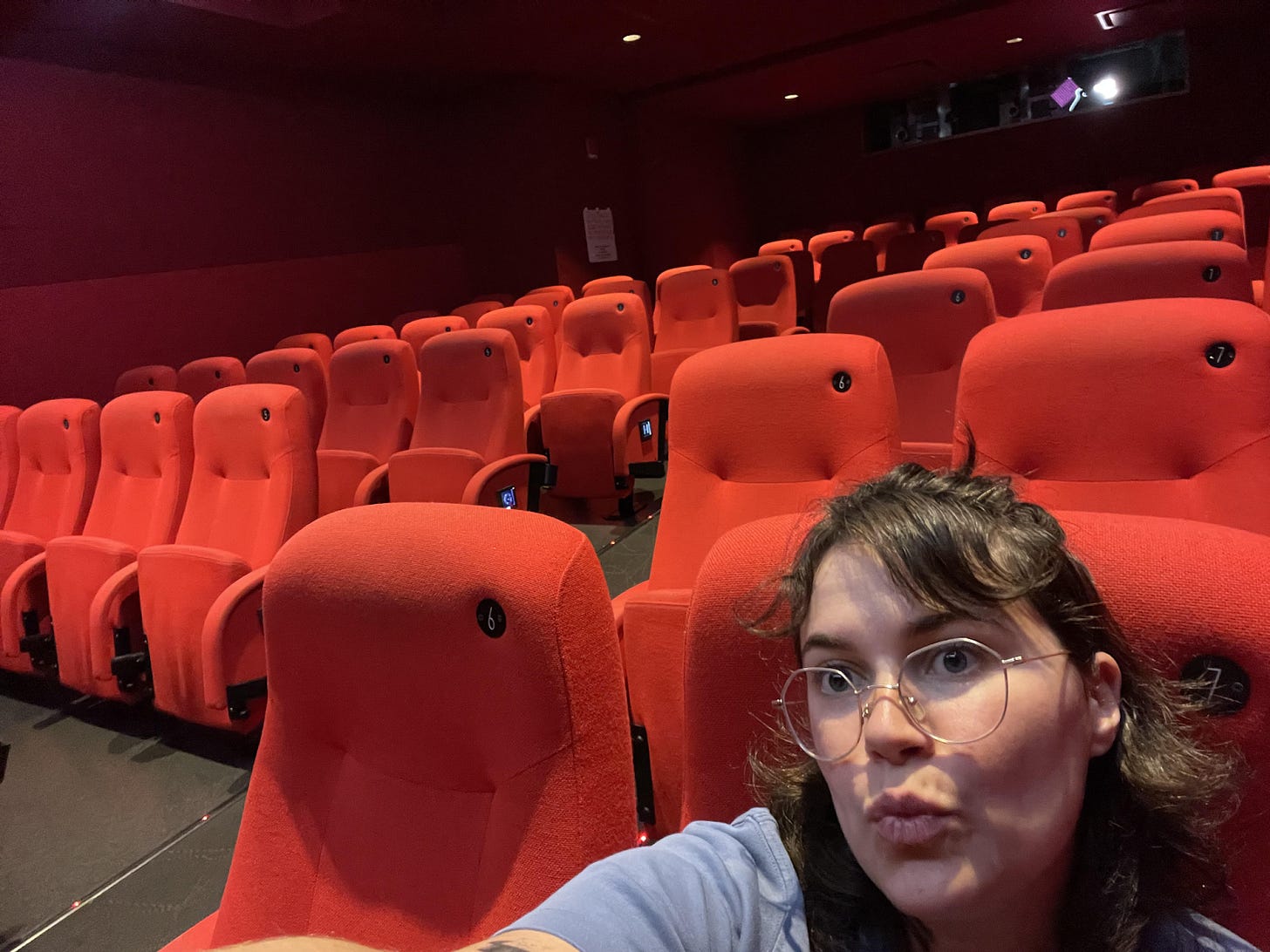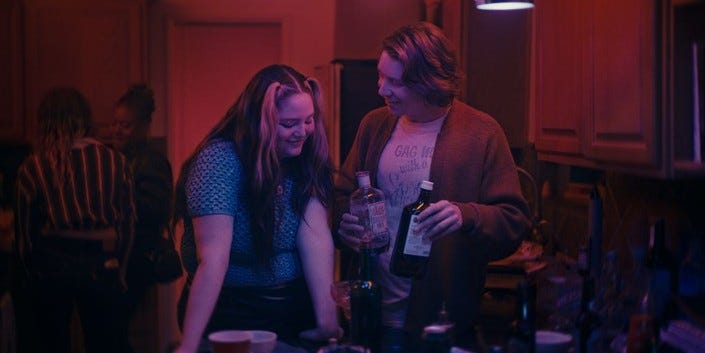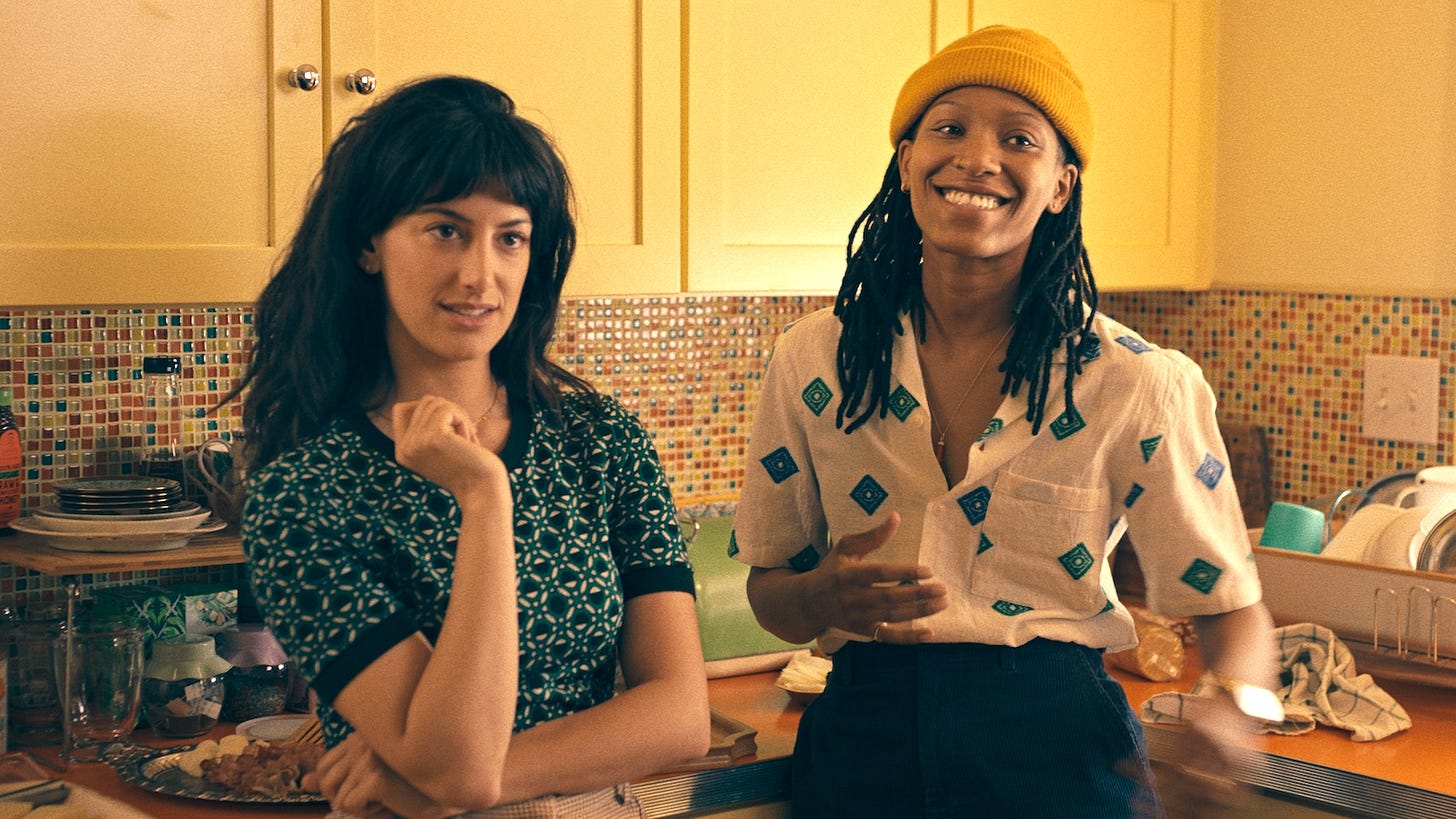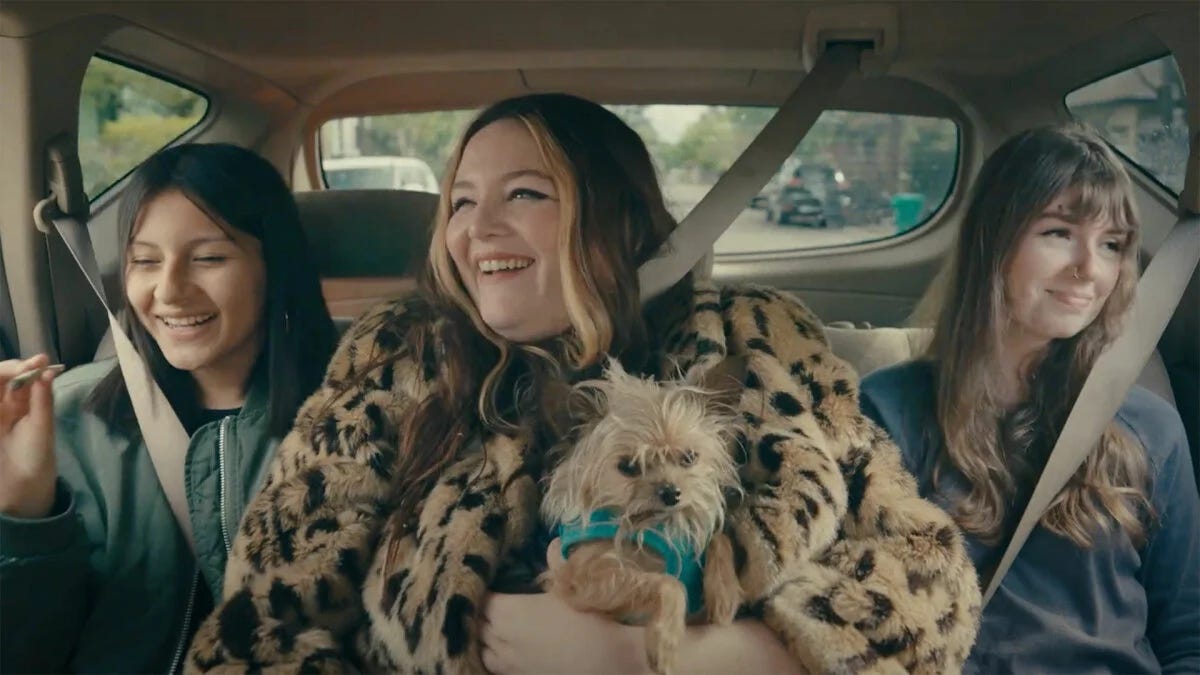Review: Love is a Joke (& Not a Very Funny One)
Hannah Pearl Utt’s Meg Stalter-led dramedy is kind of Cora Boring…
The Yearning Rating: ✰✰
Romance: ✰
Sex: ✰
Storytelling: ✰✰½
Performance: ✰✰
Yearning: ✰✰✰✰
SMASH that like button!
Light spoilers ahead.
Written by Ali Romig
Yearners, it brings me no pleasure to share this news—especially in this, our last newsletter of Pride month—but the highly anticipated Meg Stalter vehicle Cora Bora is simply not that good. I really wanted to love this movie (I mean c’mon, it’s MISS MEG STALTER), and have been waiting for its wide release since it premiered at SXSW last year. Even once some less-than-stellar early reviews started trickling in, I remained hopeful—showing up to the absolutely vacant theater by myself on a Sunday afternoon (photo evidence below, shout out to Quad, you odd little gem!). But unfortunately my optimism did not last through the film’s 92-minute runtime, and by the time the credits began to roll, I had to admit the truth: Meg can’t “hi, Gay!” herself out of the utterly forgettable writing in this movie.
Listen, I am fully aware that this is now the second “coming of age in your 30s” brand of movie I’ve felt less-than-enthusiastic about in a matter of weeks. And let me be clear: I am not against this genre as a whole. I often love these kinds of stories (most if not all of my favorite TV shows would end up in this category). And the fact that Cora Bora is riotously queer should propel it to the top. Unfortunately, I think it gets itself stuck in more ways than one. It seems more interested in being a comedy over a drama, but its jokes often fail to land or come across too erratically. Conversely, its more serious bits have potential—if only they’d been given proper attention. The interpersonal relationships that form the backbone of the story are never able to satisfyingly come to life, which makes the whole journey feel more labored than is warranted. It all just felt half-baked.
Cora Bora follows down-on-her-luck musician Cora (Meg Stalter) a year after relocating from Portland, Oregon to Los Angeles for “her career”. While the film’s title sequence (a very fun nod to Portland Riot Grrrl music vibes) shows Cora as part of a successful band called The Maybe Nots, the opening scene immediately jumps to her playing whiny acoustic solos to a nearly empty bar. Something’s obviously gone wrong—but we’ll have to wait to find out what happened. After a tense meeting with her clearly nervous manager, we watch Cora roam the city, ending up at a party where she tells a couple of PDA-happy lesbians that she and her girlfriend are in a long-distance, open relationship—which she actually feels really good about!!!!—before flirting with a flat earther. She eventually has sex with him in his apartment, which is decorated exclusively with “Live, Laugh, Love” decals. It’s all very standard “Lost Girl” fare.
It doesn’t take long for the viewer to understand Cora's relationship with her girlfriend, Justine (Jojo T. Gibbs) is most definitely on the rocks. Despite reminding people often that opening their relationship was her idea, Cora begins to freak out when she intuits that Justine may have met someone she really likes. I think one of the more interesting parts of Cora Bora is Cora’s intentionally contradictory characterization. She is both extremely avoidant, and incredibly dependent on Justine. She calls Justine repeatedly until she answers, but still declines to visit her in Portland for her graduation weekend…until she sees a red lace bra that she doesn’t recognize in the background of Justine’s Zoom. This inspires her to spontaneously book a ticket home to surprise her paramour. Once there, she finds Justine shacked up with a new full-out girlfriend, Riley (Ayden Mayeri). Naturally, further chaos ensues.
Okay, here’s my biggest issue with Cora Bora—it’s not the tone that never coalesces into something coherent, or the slightly flailing performances, or even the glacial feeling pace—it’s the fact that no one seems to think that Justine’s actions in the movie are just as chaotic and messy as Cora’s! Cora is obviously meant to be the latest addition to a long line of cinematic “delusional girls”, but let’s get one thing straight: Justine developed a committed, sustained relationship with a whole other person—even had her MOVE INTO HER AND CORA’S HOME—and never thought to explain the situation to either of her girlfriends beyond, “it’s complicated.” ?????
This would actually be kind of hilarious if the movie were about the trials and tribulations of trying to open up a relationship for the first time—but that’s not what this movie is about. This movie is about Cora, which means Justine’s actions and interiority repeatedly gets back burnered—much to the detriment of the overall narrative.
There are some really powerful, emotionally resonant ponderings in this film, especially when it comes to relationships and moving on. I particularly like when Cora breaks down, about three-fourths of the way into the film and admits that she’s worried that if she loses Justine, she’ll never meet anyone who “gets” her again—that if Justine isn’t there, she’ll simply shrivel up and disappear. Who hasn’t felt that kind of visceral fear in the wake of rejection? Unfortunately, these moments get passed over too often in favor of more frivolous, flat wandering.
This is especially disappointing when it is finally revealed what happened to Cora’s band. I feel like this moment could’ve hit much harder if we’d had a real sense of how the incident changed her—but “before” Cora seems to be very similar to “after” Cora. It makes it hard to see the movie clearly: is it a millennial “lost girl” narrative, or is it a story about how trauma changes us? There’s no reason it couldn’t be both! Cora Bora never manages to bring it home in either direction.











Bummer!